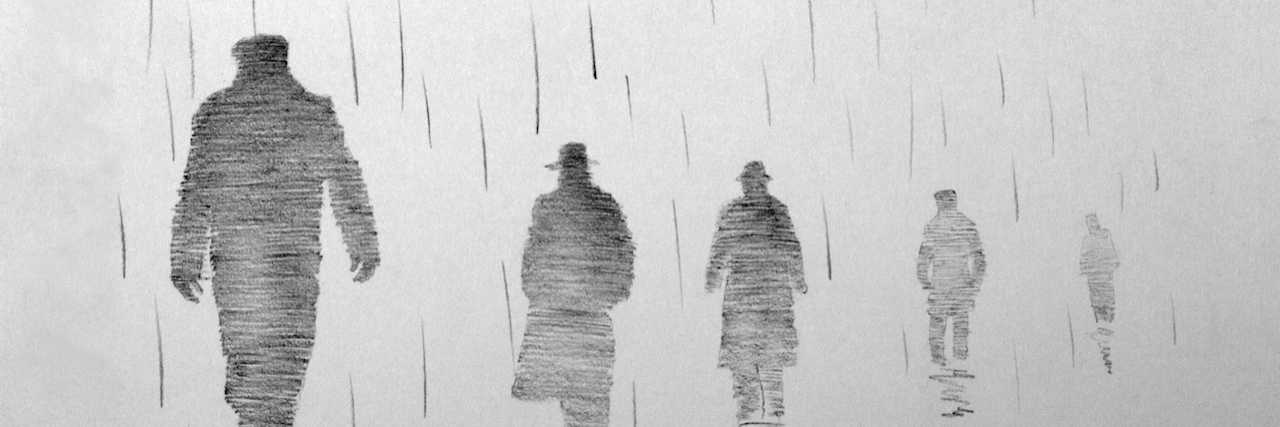When depression comes up while I’m talking to a friend, I often use simple, cliched ways to describe it. I tell them I’m having a rough day, or I’m exhausted, or I’m just feeling off. It’s so much easier and less upsetting for them, I think, than explaining what’s really going on emotionally.
For a long time, my depression symptoms were primarily physical and easier to explain to friends and family. However, the emotional piece of the disease has taken a much stronger hold on me in the past couple of years, and I’ve gone from having days or weeks of simply feeling easily worn out or just plain exhausted, to being completely debilitated by a deep, aching, empty feeling that penetrated the core of who I had always known myself to be.
I honestly want to try to describe this pain without being melodramatic or overly emotional, and yet — if you have never experienced how depression can worm its way into your soul and hurt, constantly, until you’re so tired of hurting that you feel nothing — I can understand it may seem that way. All I ask is that you read with an open mind and try to understand with an unbiased heart.
Imagine you wake up in the morning and you feel as though, overnight, your heart has sunk into the pit of your stomach and stayed there, throbbing, until it becomes a dull but persistent ache that has spread to your entire body. Maybe it’s raining and you have a dentist appointment later that day, or maybe it’s a warm sunny day and you have plans to spend it in your favorite place with your best friends: it doesn’t matter. The entire world looks ominous through the lens of the depression. Whatever lurks beyond the door of the bedroom doesn’t feel safe. Sitting up and swinging your feet out of bed feels insurmountable, not because of the mind-numbing fatigue you feel but because it just hurts inside. Just pushing yourself up to turn off your alarm makes your insides clench with discomfort and fear. You dread the moment your partner wakes up or comes into the room because you know he or she will realize immediately it is a bad day. Looking at another person makes you want to burst into tears because the internal hurt you are feeling is so strong and you dread passing that on to another human being.
This kind of sickening, draining sorrow is so exhausting and so remarkably unique in its misery (often and especially because there is no discernible reason behind its appearance in your life) that it seems like you can’t possibly get through a day (never mind a week, or a month, or a year) feeling this way. Mostly you want to go to sleep and stay there, preferring unconsciousness to pain, but if you can’t do that then you start to think of ways to stop hurting. The only times I have ever had thoughts of self-harm, which thankfully last only seconds for me and upon which I have never acted, occur when I am in the depths of feeling this way. I am grateful to say that aside from these fleeting thoughts, I have not struggled with that particular manifestation of my disease. But I do understand why seeking a physical release for the internal agony can be tempting. I jiggle my legs incessantly, I scratch bug bites too hard and for too long (one of them scarred), I pick at my cuticles. I count down from 100 over and over again in my mind. And when there is no more energy for any of this, I go blank. My husband reports watching me stare at the walls, eyes glazed over, responding to nothing, for minutes at a time. I guess I would say during these times I am hurting less because I am completely shut off from caring about anything, and yet I know it’s scary and unsettling for anyone to see how deeply apathetic I feel toward everything in that moment.
This is some of what depression has been like for me over the past couple of years. A spell like this can last a few hours, a full day or several days in a row. It can be combined with intense anxiety or it can take over all on its own. Sometimes I’ll have just one bad day in the middle of a great month. Sometimes I’ll have a few good days in the middle of a mostly-bad month. The unpredictability is scary and infuriating and can make it hard to make or keep plans. So when a friend who may be struggling with depression cancels on you last minute, or is evasive and noncommittal, or shows up and seems completely disengaged — I hope, maybe, you’ll think of this post and feel somewhat better enabled to comprehend what they’re going through. Be patient, ask what you can do to help, and love them the best you know how.
Follow this journey on Go Where It Hurts.
If you or someone you know needs help, see our suicide prevention resources.
If you need support right now, call the Suicide Prevention Lifeline at 1-800-273-8255.

